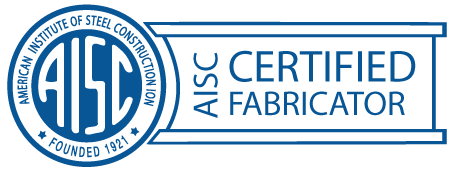What are the benefits of using steel in construction? This question has a dual answer. Firstly, this versatile alloy is the most important metallic component of all construction work. Secondly, most construction equipment is also fabricated primarily out of steel. From heavy beams to thin wires, steel offers endless possibilities!
Uses of Steel in Construction
#1: Steel Frames
Steel beams and columns are employed as the major load-bearing components of modern structures. Strong, but flexible enough to withstand earthquakes and extreme conditions, they are used for everything from the smallest outbuilding to the intricate architectural designs of towering skyscrapers.
#2: Prefabricated Steel
Prefabricated steel panels shorten construction time and reduce costs, while boosting quality. These can be used for everything from walls to roofs to canopies, often in conjunction with steel framing. Prefabricated steel makes possible complicated designs and engineering of both underground and aboveground constructions.
#3: Bridges
Steel is the best option anywhere a large gap needs to be spanned. It’s stronger than concrete, both under tension and compression. From narrow footbridges to spectacular suspension bridges, steel has the advantages of superior strength to cost ratio, and stiffness to weight ratio.
#4: Piles
Any construction is only as strong as its foundations. Steel piles can be driven deep into any material from soft earth to hard rock. They can resist all sorts of adverse weather and substrate conditions. Steel piles require minimal site excavation and can be installed very rapidly.
#5: Utilities
From poles to piping, steel can be used for utilities such as electricity supply or water reticulation. For electrical poles, galvanized steel lasts much longer than wooden ones. For water supply, it outperforms plastic and concrete piping in terms of strength.
#6: Storage
From standpipes to hi-tech pressure vessels, steel tanks can contain everything from drinking water to explosive fuels and hazardous chemicals. They can be aboveground, underground, vertical, or horizontal, and come in any size from holding a few gallons of domestic heating oil to millions of gallons of water.
#7: Casings
Steel casing protects anything that needs to be run through the ground. This includes underground water and gas lines, cables and fiber optics. It is also used to line shafts and tunnels.
#8: Penstocks
Penstocks are sluices, gates, or intake structures that control water flow, or enclosed pipes that deliver water to hydro turbines and sewerage systems.
Learn More about Steel Penstock Fabrication here.
Advantages of Steel In Construction
People working in construction prefer to use steel because it offers the following benefits
- Reduced construction time and cost: Prefabrication of sections can reduce on-site time by up to a third. Time saved translates into money saved.
- Safety: Steel constructions require minimal maintenance, especially when pre-treated with galvanizing, metalization or special coatings. It’s also fire and pest resistant.
- Ductility and warning before failure: Steel can withstand extreme tensile stresses without fracturing. It buckles or elongates before fracturing, usually providing time for repairs or load reduction.
- Reliability: Steel is very consistent due to strictly enforced standards for manufacturing, testing and quality control.
- Uniformity, durability and performance: The properties of steel don’t change much over time if properly maintained.
- Strong and lightweight: The high strength of steel means a huge reduction in dead loads as all parts of the construction can be thinner and lighter without compromising the integrity
- Design adaptability: Because steel is so versatile and strong, it can be modified to fit almost any design. Architects and engineers can bring their visions into existence, no matter how large or complex.
- Longevity: Steel constructions can last for a very long time, if the metal is properly treated and maintained at regular intervals.
T BAILEY LLC – Leaders in Steel Construction
Multi-award-winning and extensively certified T BAILEY LLC can turn steel into just about anything that you want. Here are some industries that we serve, and the construction services that we offer:
- Marine: Steel ramp and pontoon systems; pile cap frames; breasting dolphin caps, fender systems.
- Transportation: Permanent/temporary casing for shafts and tunnels; concrete column jacketing; piles for bridges and elevated railways.
- Chemical: Shop-built or field-erected tanks; ASME pressure vessels; chemical reactors.
- Water: AWWA D100 water storage tanks, reservoirs and standpipes; piles for hydroelectric facilities; reticulation piping and penstocks.
- Wastewater: CSO and SSO wastewater, raw waste and effluent storage tanks; dewatered sludge silos, chlorination, pH balancing, ADAT, anaerobic digestion, flocculation, etc. tanks.
- Pulp and Paper: Black liquor, green liquor, clarifier, batch digester, filtrate, caustic storage and blowdown tanks.
- Oil: Oil reservoirs; vertical, horizontal, and underground bulk storage tanks; Fireguard® tanks.
- Gas: Pressurized steel vessels for propane, LNG, etc.; low-pressure tanks for oil, diesel, fuel oil, etc.
Conclusion
T BAILEY LLC are steel specialists, offering unsurpassable products and services. Every fabrication or construction project that we undertake is seen through from inception to completion. Contact us today to find out how we can help you get your design off the drafting table and onto the construction site.






